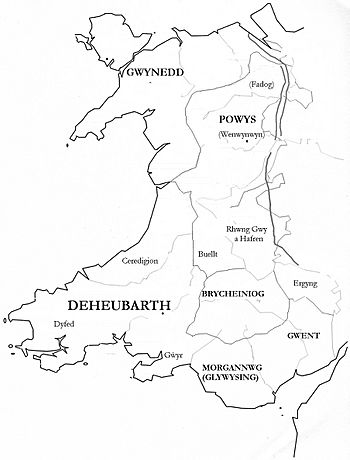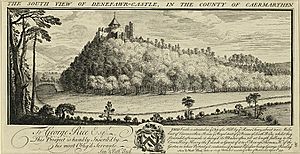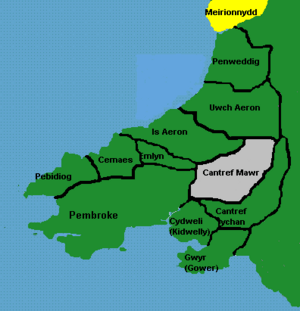Deheubarth facts for kids
Quick facts for kids
Kingdom of Deheubarth
Teyrnas Deheubarth
|
|||||||||||
|---|---|---|---|---|---|---|---|---|---|---|---|
| 920–1197 | |||||||||||
|
Anthem: Unbennaeth Prydain
"The Monarchy of Britain" |
|||||||||||

Medieval kingdoms of Wales.
|
|||||||||||
| Capital | Dinefwr | ||||||||||
| Common languages | Old Welsh | ||||||||||
| Government | Monarchy | ||||||||||
|
• 920–950
|
Hywel Dda | ||||||||||
|
• 1081
|
Rhys ap Tewdwr | ||||||||||
|
• 1155–1197
|
Rhys ap Gruffydd | ||||||||||
| Historical era | Middle Ages | ||||||||||
|
• Established
|
920 | ||||||||||
|
• Disestablished
|
1197 | ||||||||||
| Currency | ceiniog cyfreith & ceiniog cwta |
||||||||||
|
|||||||||||
| Today part of | |||||||||||
Deheubarth (pronounced deh-HEU-barth) was an important kingdom in south Wales during the Middle Ages. Its name means "Right-hand Part," which referred to the southern lands of Wales. It was different from other Welsh kingdoms like Gwynedd in the north or Powys in the east.
Deheubarth is often used to describe the lands ruled by the House of Dinefwr. However, it wasn't always seen as a single, named kingdom like Gwynedd. Sometimes, it was simply called "the Southern Britons." In older writings, "Deheubarth" could even refer to all of modern Wales, to tell it apart from the northern lands.
History of Deheubarth

Deheubarth was formed around the year 920 by a famous Welsh ruler named Hywel Dda (Hywel the Good). He brought together the smaller territories of Seisyllwg and Dyfed. Later, the Kingdom of Brycheiniog was also added.
The main court for this area used to be in Caerleon. But Hywel Dda's family built a new, strong base at Dinefwr Castle, near Llandeilo. This castle became so important that his family became known as the House of Dinefwr.
After Hywel Dda's time, Deheubarth faced many challenges. It was often attacked and taken over by other Welsh kingdoms from the north and east. For example, Llywelyn ap Seisyll of Gwynedd took control in 1018. Later, Gruffydd ap Llywelyn of Gwynedd also conquered it in 1055.
In 1078, Rhys ap Tewdwr became a key ruler. He managed to bring his family's power back to south Wales. But soon, a new threat appeared: the Normans. These invaders from England began to take over Welsh lands. In 1093, Rhys ap Tewdwr was killed while fighting them. His son, Gruffydd, had to go into hiding for a while.
After King Henry I died in 1136, Gruffydd ap Rhys joined forces with Gwynedd to fight back against the Normans. He helped win a big victory at the Battle of Crug Mawr. However, the newly freed land of Ceredigion was kept by Gwynedd, not given back to Gruffydd's family.
Gruffydd's son, The Lord Rhys (Rhys ap Gruffydd), ruled for a long time and was very skilled. During his rule, and because of civil wars in Gwynedd, Deheubarth became very powerful again. It was almost as strong as it had been under Hywel Dda two centuries earlier.
However, when Lord Rhys died in 1197, he divided his kingdom among his many sons. None of them were ever as powerful as he had been. By the early 1200s, when Llywelyn the Great became strong in Gwynedd, the lords of Deheubarth were mostly under his control.
After King Edward I of England conquered Wales, Deheubarth was divided into new areas. These became the historic counties of Cardiganshire, Carmarthenshire, and Pembrokeshire.
Religion in Deheubarth
The church played an important role in Deheubarth. One notable person was Sulien, who was a leader at the Llanbadarn Fawr monastery in Ceredigion. Born around 1030, he became the Bishop of St David's twice.
At this time, priests were allowed to marry. Sulien's sons also became church leaders. They created many important books and poems in Latin and Welsh. They were very involved in the church and politics of Deheubarth. One son, Rhygyfarch, wrote the Life of Saint David, a very important text. Another son, Ieuan, was a talented writer and artist who copied religious works.
Rulers of Deheubarth
The kingdom of Deheubarth was formed by joining smaller kingdoms like Ceredigion, Seisyllwg, and Dyfed.
- Hywel Dda (Hywel the Good) (920–950) - He united the lands to form Deheubarth.
- Owain ap Hywel (950–986) - Hywel's son.
- Maredudd ab Owain (986–999) - Owain's son.
- Llywelyn ap Seisyll (1018–1023) - Also a prince of Gwynedd.
- Hywel ab Edwin (1033–1044)
- Gruffydd ap Rhydderch (1047–1055)
- Gruffydd ap Llywelyn (1055–1063) - An invader and prince of Gwynedd.
- Maredudd ab Owain ab Edwin (1063–1072)
- Rhys ab Owain (1072–1078) - Maredudd's brother.
- Rhys ap Tewdwr (1078–1093) - A cousin who brought stability before the Norman invasion.
Deheubarth was under Norman control from 1093 to 1155.
- Gruffydd ap Rhys (1116–1137) - He ruled a part of Deheubarth with Norman permission.
- Anarawd ap Gruffydd (1136–1143) - Gruffydd's son.
- Cadell ap Gruffydd (1143–1151) - Anarawd's brother.
- Maredudd ap Gruffydd (1151–1155) - Cadell's brother.
- The Lord Rhys (Rhys ap Gruffydd) (1155–1197) - A very powerful ruler who restored much of Deheubarth's strength.
- Gruffydd ap Rhys (1197–1201) - Lord Rhys's son.
- Maelgwn ap Rhys (1199–1230) - Disputed control with his brother.
- Rhys the Hoarse (Rhys Gryg) (1216–1234)
From 1234 to 1283, Deheubarth was controlled by the princes of Gwynedd.
See also
 | William L. Dawson |
 | W. E. B. Du Bois |
 | Harry Belafonte |




